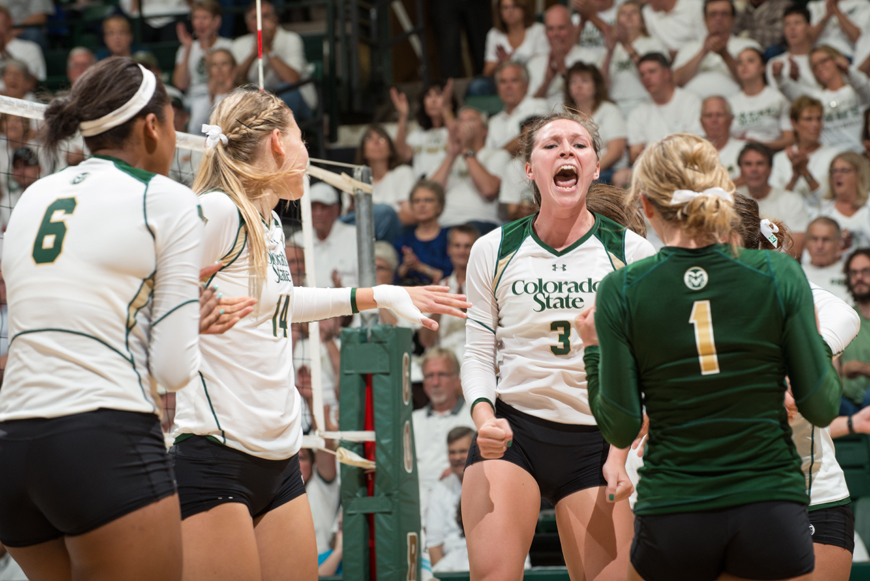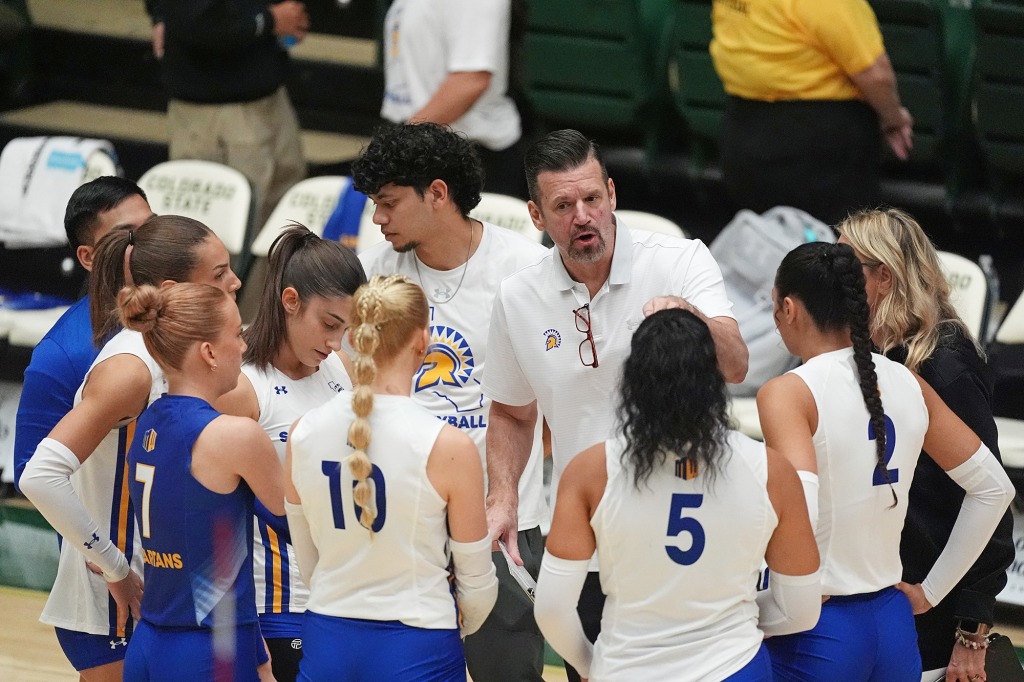In a season filled with controversy, San Jose State University (SJSU) women’s volleyball coach Todd Kress has publicly responded to the fallout surrounding his team’s inclusion of transgender athlete Blaire Fleming. The coach claims that the true source of hatred toward his program stems not from the presence of a transgender athlete on his roster, but from the forfeitures made by opposing teams. These forfeits, he argues, have led to hateful and mean-spirited messages directed at SJSU athletes and staff members, significantly affecting the team’s morale and well-being.
Here's ads banner inside a post

Coach Kress’s comments came after his team’s disappointing loss in the Mountain West Conference (MWC) tournament final against Colorado State University on Saturday, a loss that followed a series of forfeits by five other schools in the league. These forfeitures were a direct result of Fleming, a transgender woman, playing for the team. While Kress has continually defended his team’s adherence to NCAA rules, he has been adamant in his belief that the vitriol directed at his players is unjust and undeserved.

Here's ads banner inside a post
The Heart of the Issue
The core of the controversy lies in the fact that Fleming is a transgender woman playing on a women’s volleyball team. Despite the NCAA’s guidelines that allow transgender athletes to compete in accordance with their gender identity, the inclusion of Fleming has sparked outrage among certain players, coaches, and fans. These groups have voiced concerns about the fairness of allowing a transgender woman to compete against biological women, particularly in sports like volleyball, where physical strength and athleticism can play a significant role.

Throughout the season, Kress has been outspoken in his defense of Fleming, never publicly condemning the inclusion of the transgender player on his team. He has repeatedly stated that SJSU has followed all the appropriate NCAA rules and that the team has not sought to undermine the participation of any other athletes. Instead, Kress’s focus has remained on the emotional and mental toll that the controversies surrounding his team have caused.
Here's ads banner inside a post
In his statement following the Mountain West final, Kress emphasized that the focus should not be on his team’s participation in the tournament, but rather on the impact of the forfeitures. He explained that these forfeits denied the SJSU athletes, particularly the women on his team, the opportunity to compete. According to Kress, the true victim of this situation is the women on his team, who had their chances to play diminished by the decisions of the opposing schools.

“I will not sugarcoat our reality for the last two months,” Kress said. “Our team prepared and was ready to play each match according to established Mountain West and NCAA rules of play. We did not take away anyone’s participation opportunities.”
The Fallout of Forfeits
The consequences of these forfeitures have been severe, both emotionally and mentally, for the athletes involved. Kress detailed the unrelenting hate that followed the forfeits, claiming that each announcement of an opponent’s decision to not play against SJSU resulted in an outpouring of hate-filled messages directed at his players, coaching staff, and the school’s volleyball program.

“Sadly, others who for years have played this same team without incident chose not to play us this season,” Kress said. “To be clear, we did not celebrate a single win by forfeiture. Instead, we braced for the fallout.”
The messages, Kress notes, were “appalling” and targeted not just the players on the team, but anyone associated with the program, from coaches to family members. These hateful messages have added an emotional weight to the already challenging season, which has included the public backlash over Fleming’s inclusion.

For Kress, the situation is one of profound injustice. “Each forfeiture announcement unleashed appalling, hateful messages individuals chose to send directly to our student-athletes, our coaching staff, and many associated with our program,” he said. The impact, according to Kress, has been deeply felt within the team, further exacerbating the tension surrounding the transgender athlete’s participation in the league.
A Personal Toll on Players
Despite Kress’s public statements, not all players on the team feel the same way about the situation. In a separate interview with Blaze News, SJSU player Brooke Slusser offered a different perspective on the team’s experience. Slusser indicated that while the team has had meetings to check on the well-being of Blaire Fleming, the players themselves have sometimes felt sidelined.

“We’ve had meetings, and it’s a lot of just checking in on Blaire,” Slusser said. “We were like, ‘what about us?'”
This sentiment echoes the broader feeling that the players on Kress’s team have been forced to endure the controversy surrounding Fleming’s inclusion, without much consideration for their own mental health and emotional needs. Slusser’s comments suggest that the team’s struggles have been compounded by a lack of attention to their own concerns, as the focus has often been on managing the fallout from the forfeits rather than supporting the athletes themselves.
A Divided Community
The debate over the inclusion of transgender athletes in women’s sports has divided communities across the country, and the situation at San Jose State University is no exception. The reactions to Kress’s defense of his team have been mixed, with some supporting his stance and others accusing him of failing to acknowledge the challenges that female athletes face in a system that allows transgender women to compete alongside them.
One of the most vocal critics has been Riley Gaines, a former NCAA swimmer who competed against transgender swimmer Lia Thomas. Gaines expressed her frustration with Kress’s remarks, arguing that by blaming the forfeits on “hateful messages” instead of addressing the inherent issue of fairness in women’s sports, Kress was undermining the legitimate concerns of female athletes.

“Ah, yes. Blame the women for wanting safe and fair sport. Not the narcissistic man. One man’s feelings > all women’s safety,” Gaines wrote on X (formerly Twitter).
Kaitlynn Wheeler, a former member of the Kentucky swim team, also weighed in on the controversy, accusing Kress of “gaslighting” female athletes by dismissing their concerns about fairness and safety. “Women are ‘hateful’ but a man in their sport is ‘brave’? This is pure misogyny,” Wheeler wrote.
Title IX Complaints and Internal Tensions
The situation has become even more complicated by allegations of internal conflict within the team. Reports suggest that Kress has filed Title IX complaints against players who have expressed dissatisfaction with the team’s inclusion of Fleming. One such complaint reportedly involved Brooke Slusser, who allegedly used masculine pronouns to refer to Fleming during a media interview. Kress reportedly viewed this as a violation of the rights of transgender athletes and filed a formal complaint.

While Kress’s actions suggest a commitment to protecting the rights of transgender individuals, they have also led to further division within the team. The conflict surrounding the issue of pronouns and the treatment of Fleming has only served to deepen the rift between those who support the inclusion of transgender athletes and those who believe it undermines the integrity of women’s sports.
Moving Forward
The situation at SJSU is emblematic of the larger debates taking place in sports and society today regarding the inclusion of transgender athletes in women’s competitions. As the controversy continues, it is clear that the debate will not be resolved easily. For Kress and his team, the challenge will be navigating these complex issues while also ensuring that the players’ physical and emotional well-being remains a top priority.
As the debate rages on, one thing remains certain: this issue is far from over, and it will continue to spark intense conversations about fairness, safety, and inclusion in women’s sports for the foreseeable future.

